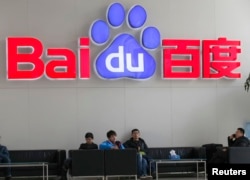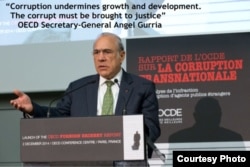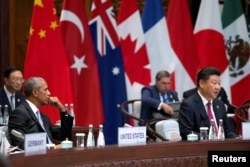The European Union's efforts to force Apple to pay back taxes worth $14.5 billion could open up many other multinational corporations to similar actions, which analysts say may strain relations among countries across the globe.
With many expecting the European Commission to extend its investigations to other multinationals for alleged tax evasion in Europe, in China, financial analysts say Beijing will also try to stop companies from shifting their tax liability to places where they would pay less.
"I think the tax investigations will go beyond Apple, and other multinational corporations will be covered. This might also affect Chinese investments in the EU," said Oliver Rui, a Shanghai-based CEIBS professor of finance and accounting, in an interview with VOA.
The move on Apple comes after anti-trust regulators in the European Commission launched investigations into Google's financial affairs. With regulators focused on the two American technology giants, the battle is being closely watched by other firms like China's Internet giant Baidu, that hope to challenge the dominance of U.S. firms in Europe's Internet market.
"...I think European countries are frustrated that they don't have enough number of choices. That actually creates opportunities for companies like us," Baidu CEO Robin Li told CNBC early this week.
Positive outcome?
For years, international organizations including the United Nations, the Overseas Economic Cooperation and Development and the Paris regulator, Financial Action Task Force, have been engaged in creating and implementing global standards to check tax evasion. The EU has taken the lead in these efforts with the Apple case.
Some experts believe the Apple case shows that anti-tax evasion methods adopted by these agencies are working. They expect authorities will soon begin pressuring other similar global corporations, which avoid taxes by shifting their legal address from highly taxed countries to low taxed locations.
"The Apple case could be used as a way of generating political will to push these initiatives forward," Denisse V. Rudich, the London-based director of G20 Research Group, told VOA. "However, there remains a long road ahead for these initiatives to come to fruition as they are seen as infringing upon state sovereignty."
Angel Gurria, the OECD secretary general, recently said there can be no rollback on the international moves to check companies that get away with paying very little in taxes in different locations.
MNC's are known to use a ploy called base erosion and profit shifting (BEPS) to artificially shift profits to low or no-tax locations by exploiting gaps and mismatches in tax rules of different countries.
"Thanks to the BEPS measures, double non-taxation (as was the case of Apple, recently highlighted) will no longer be possible," Gurria said at the recently concluded meeting of the Group of 20 nations in China. "These are not just words: the laws in Ireland that allowed the Apple arrangement have already been dismantled; thousands of tax treaties will soon be modified by a single multilateral convention to stop abuses..."
Apple pays its taxes in Ireland, which has been accused of setting a rate of just 1 percent of the company's profits from sales in all of Europe, instead of the applicable 12.5 percent. Ireland is defending its decision to charge low taxes from Apple. The EU insists that the company should be forced to pay the full amount.
Europe's Organization for Economic Cooperation and Development has proposed a new country-by-country reporting requirement, which would force companies to disclose the revenue, profit and tax paid in each country combined with details on employment, capital and assets used in each nation.
"Given the accounting and compliance costs of carrying out country-by-country reporting, there is going to be little support from the private sector in doing this," Rudich of the G20 Research Group, which is affiliated to the University of Toronto, said.
Divided world
At the G-20 summit in China, there were reports that behind the scenes, European Union and U.S. officials were locked in tense discussions over the tax issue.
The United States expressed concern that the EU's moves might result in serious loss of tax revenue because American companies may try to pay less at home while moving their tax base to other locations.
"The one thing that we have to ensure we do is to move in concert with other countries, because there is always a danger that if one ... acts unilaterally, that it's not just a matter of a U.S. company being impacted, but it may also have an impact in terms of our ability to collect taxes from that same company," U.S. President Barack Obama told journalists at the end of the summit in the Chinese city of Hangzhou on Tuesday.
"In the same way, we then have to do some coordination with even some of our closest allies racing to the bottom in terms of how they enforce their tax policies in ways that lead to revenue shifting and tax avoidance in our country," he added.







